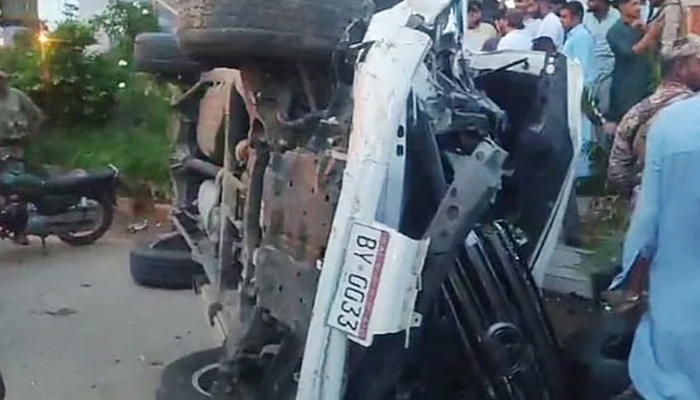Diyat law in the limelight after Karsaz incident
On Monday evening, a speeding luxury car driven by a woman hit three motorcycles and a four-wheeler before overturning near Karsaz, claiming the lives of Imran Arif, 60, and his 26-year-old daughter Amna.
The loss of innocent lives in the accident caused by rash driving sparked widespread outrage on social media as many shared videos and photos of the woman who appeared to be in a confused state after she was caught by a crowd.
Most of the commentators on social media predict that the woman would be sooner or later released after availing the Diyat (blood money) provisions of the Pakistan Penal Code. Courts in Pakistan have often set free suspects in cases of murder and bodily harm to poor people after the victims' heirs settled with them in return for financial compensation.
There is a long list of such cases. In 2011, an American national, Raymond Davis, killed two men in broad daylight in Lahore and soon walked free after invoking Diyat provisions of the Pakistan Penal Code.
In 2013, the family of Shahzeb Khan, who was murdered in cold blood by a businessman's son and his three accomplices in Karachi's DHA, pardoned the influential killers who were later acquitted.
Last year, PPP MPA Jam Owais and his four servants were acquitted in the murder case of activist Nazim Jokhio after the victim's family, including her mother and widow, pardoned them. These are but a few examples.
The woman SUV driver has been booked under the sections 320 (punishment for Qatl-i-Khata by rash or negligent driving), 337-G (punishment for hurt by rash or negligent driving), 279 (rash driving or riding on a public way), 427 (mischief causing damage to the amount of fifty rupees) and 322 (manslaughter) of the penal code. It may be noted that the section of Qatl-i-amd (premediated murder) has not been invoked in the FIR.
All the sections invoked against the suspect, except the Section 279 of the PPC, are compoundable, says Advocate Uzair Ghouri, who is representing the complainant in the case. This means that charges against the accused can be dropped if the aggrieved party agrees to enter into a compromise. "The legal principle is that when the primary offence is compoundable, the lesser offences are treated in a similar way," the lawyer explained.
Through the Criminal Law Amendment Ordinance VII of 1990, commonly known as Qisas and Diyat Ordinance, PPC sections related to bodily harm and murder were repealed and replaced with new provisions to bring them in conformity with the Islamic injunctions and judgments of the Supreme Court's Shariat Appellate Bench.
The amended provisions allow legal heirs of a deceased person to settle with a killer. The ordinance was re-promulgated every four months until it became an Act of Parliament in 1997. The Federal Shariat Court had declared the provisions of the PPC related to murder and bodily harm contrary to the Shariah. Subsequently, then government filed an appeal before the Shariat Appellate bench of the Supreme Court that dismissed the same in July 1989, ordering the government to bring amendment to the relevant laws.
The appellate bench had ruled that the provisions that did not allow Diyat in cases of Qatl-i-amd (premeditated murder) and Jurooh-al-amd (deliberately causing hurt) as was prescribed in Holy Quran and Sunnah were against the injunctions of Islam.
The law's application has sparked debate time and again with critics arguing that it allows the wealthy to escape punishment. The manner of its implementation has been criticised for being biased towards the wealthy as only those who can afford to pay the blood money are able to benefit from it. In many cases, families have been pressured into accepting blood money due to economic or social coercion.
-
 AI Film School Trains Hollywood’s Next Generation Of Filmmakers
AI Film School Trains Hollywood’s Next Generation Of Filmmakers -
 Royal Expert Claims Meghan Markle Is 'running Out Of Friends'
Royal Expert Claims Meghan Markle Is 'running Out Of Friends' -
 Bruno Mars' Valentine's Day Surprise Labelled 'classy Promo Move'
Bruno Mars' Valentine's Day Surprise Labelled 'classy Promo Move' -
 Ed Sheeran Shares His Trick Of Turning Bad Memories Into Happy Ones
Ed Sheeran Shares His Trick Of Turning Bad Memories Into Happy Ones -
 Teyana Taylor Reflects On Her Friendship With Julia Roberts
Teyana Taylor Reflects On Her Friendship With Julia Roberts -
 Bright Green Comet C/2024 E1 Nears Closest Approach Before Leaving Solar System
Bright Green Comet C/2024 E1 Nears Closest Approach Before Leaving Solar System -
 Meghan Markle Warns Prince Harry As Royal Family Lands In 'biggest Crises' Since Death Of Princess Diana
Meghan Markle Warns Prince Harry As Royal Family Lands In 'biggest Crises' Since Death Of Princess Diana -
 Elon Musk Weighs Parenthood Against AI Boom, Sparking Public Debate
Elon Musk Weighs Parenthood Against AI Boom, Sparking Public Debate -
 'Elderly' Nanny Arrested By ICE Outside Employer's Home, Freed After Judge's Order
'Elderly' Nanny Arrested By ICE Outside Employer's Home, Freed After Judge's Order -
 Keke Palmer On Managing Growing Career With 2-year-old Son: 'It's A Lot'
Keke Palmer On Managing Growing Career With 2-year-old Son: 'It's A Lot' -
 Key Details From Germany's Multimillion-euro Heist Revealed
Key Details From Germany's Multimillion-euro Heist Revealed -
 David E. Kelley Breaks Vow To Cast Wife Michelle Pfeiffer In 'Margo's Got Money Troubles'
David E. Kelley Breaks Vow To Cast Wife Michelle Pfeiffer In 'Margo's Got Money Troubles' -
 AI-powered Police Robots To Fight Crime By 2028: Report
AI-powered Police Robots To Fight Crime By 2028: Report -
 Everything We Know About Jessie J's Breast Cancer Journey
Everything We Know About Jessie J's Breast Cancer Journey -
 Winter Olympics 2026: What To Watch In Men’s Hockey Today
Winter Olympics 2026: What To Watch In Men’s Hockey Today -
 Winnie Harlow Breaks Vitiligo Stereotypes: 'I'm Not A Sufferer'
Winnie Harlow Breaks Vitiligo Stereotypes: 'I'm Not A Sufferer'




